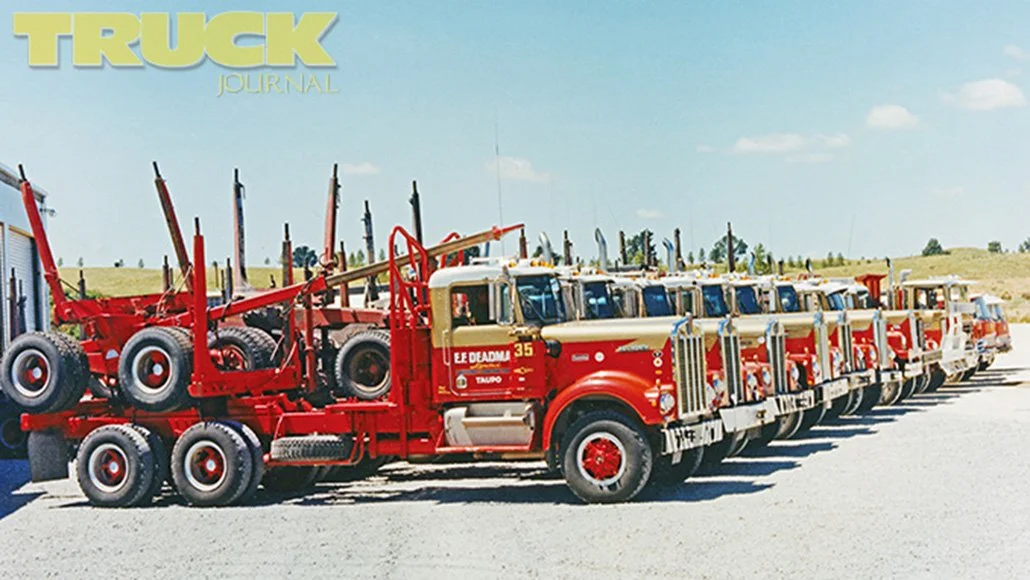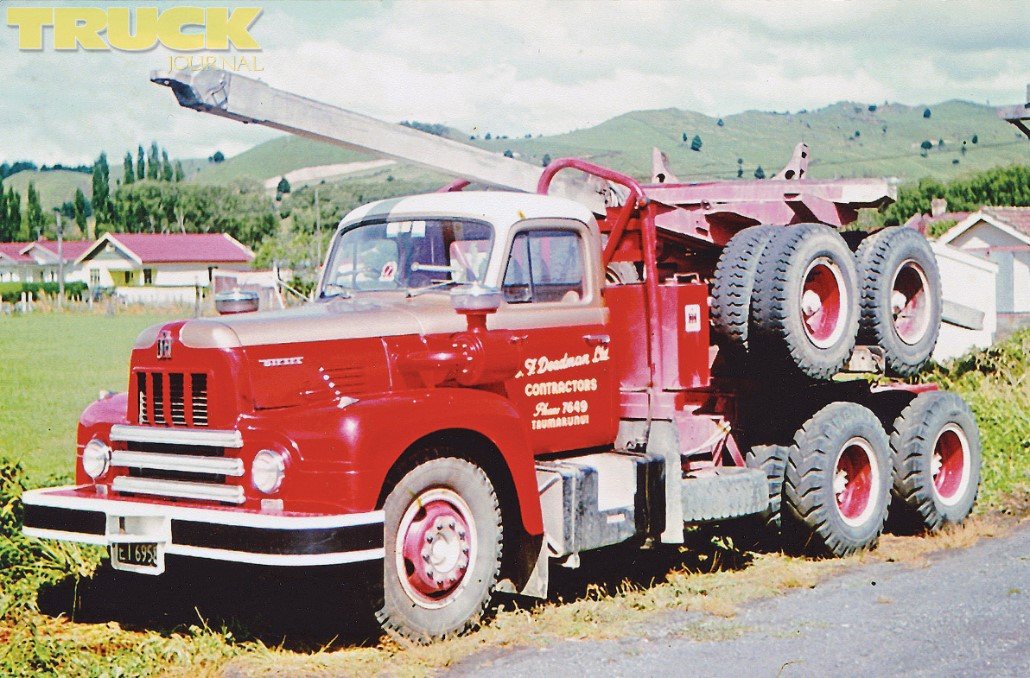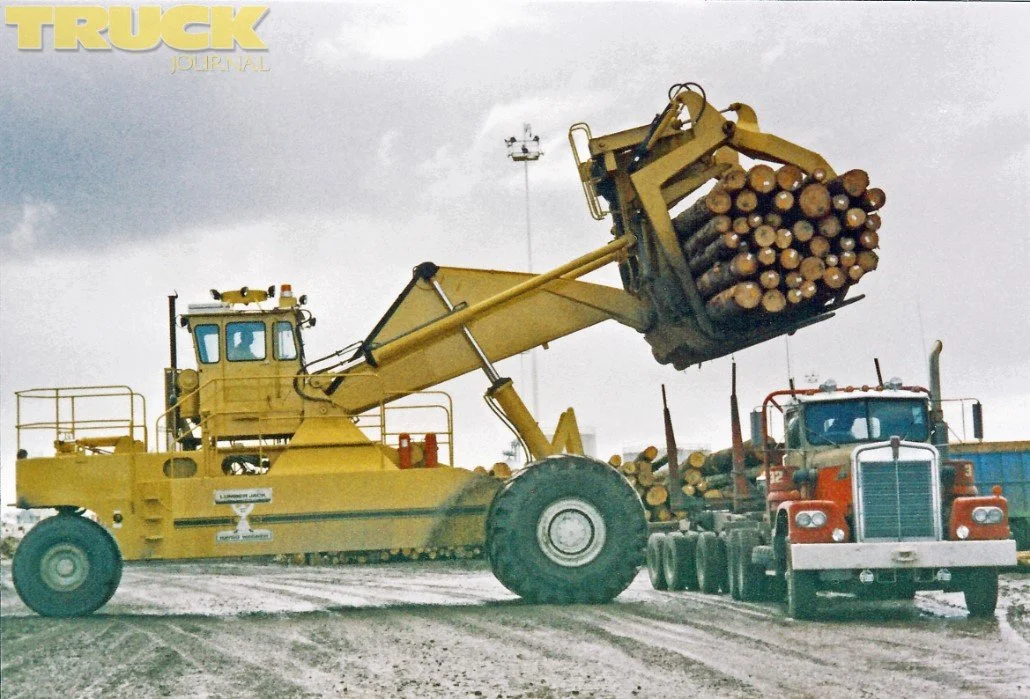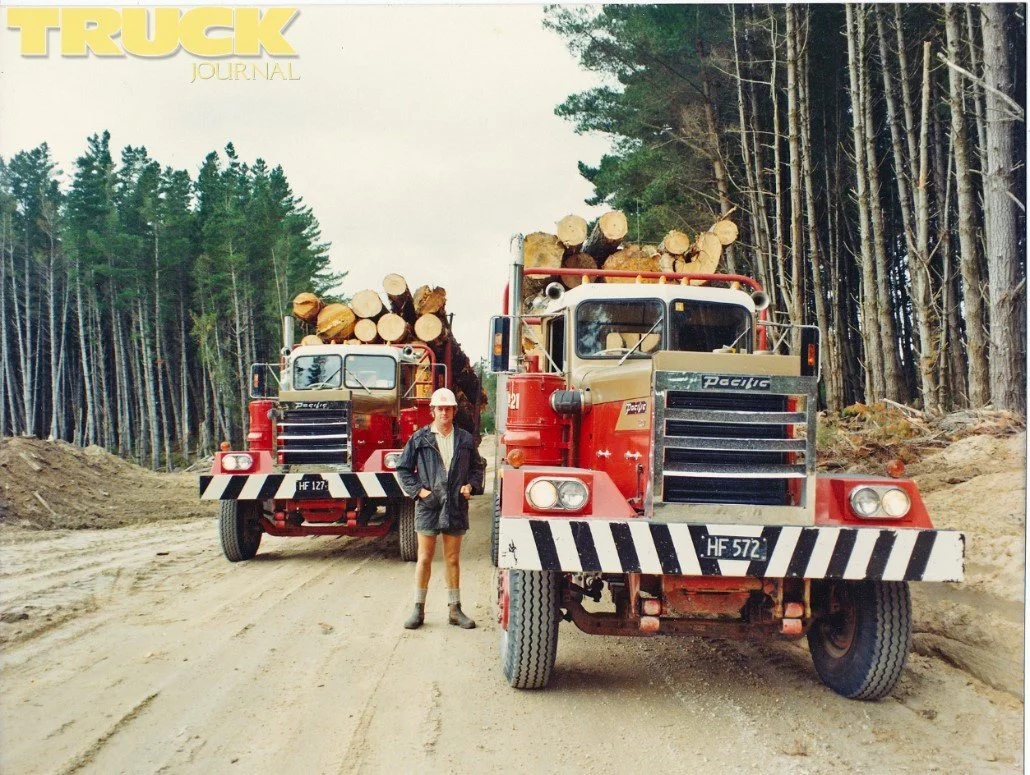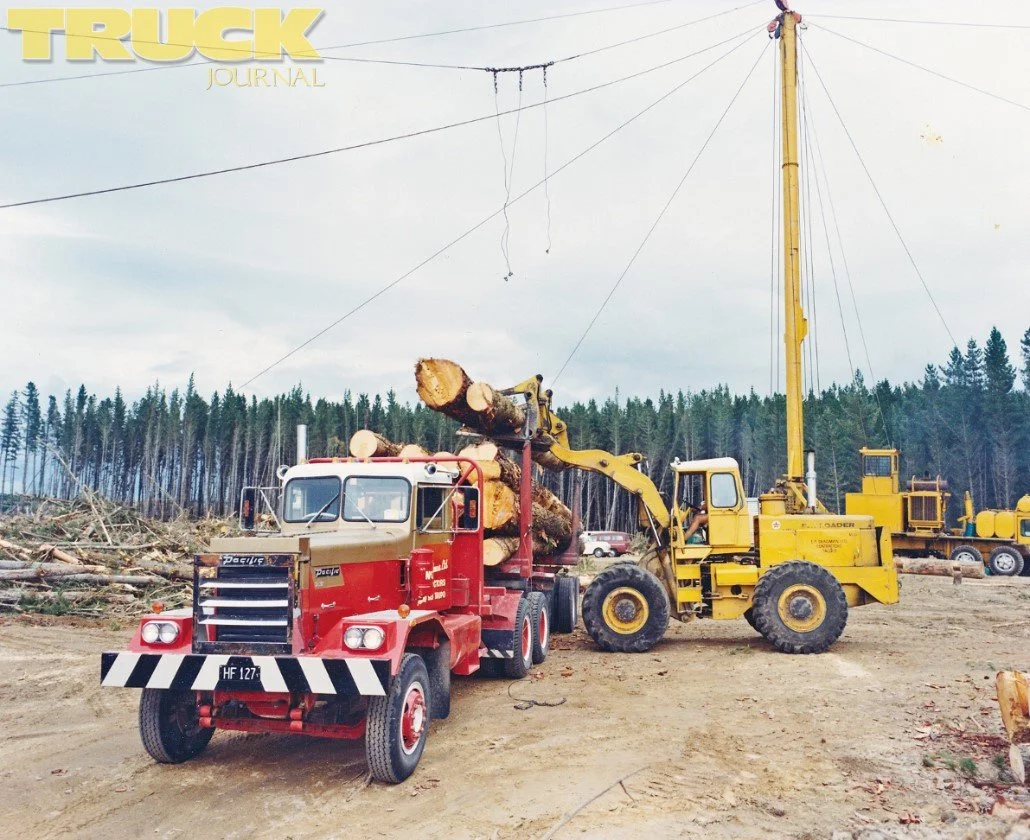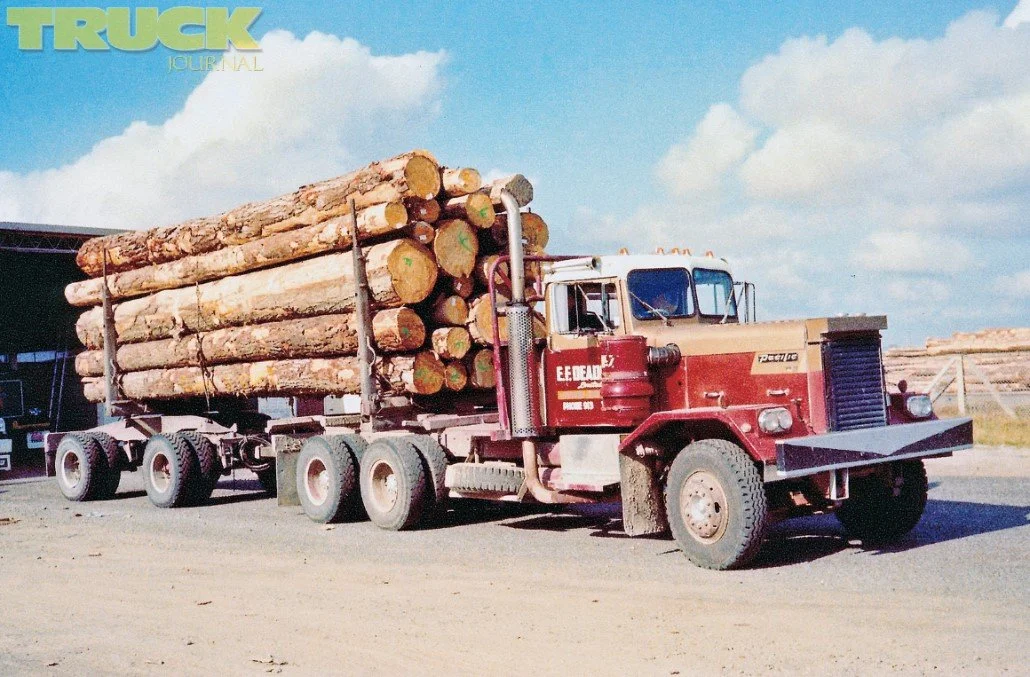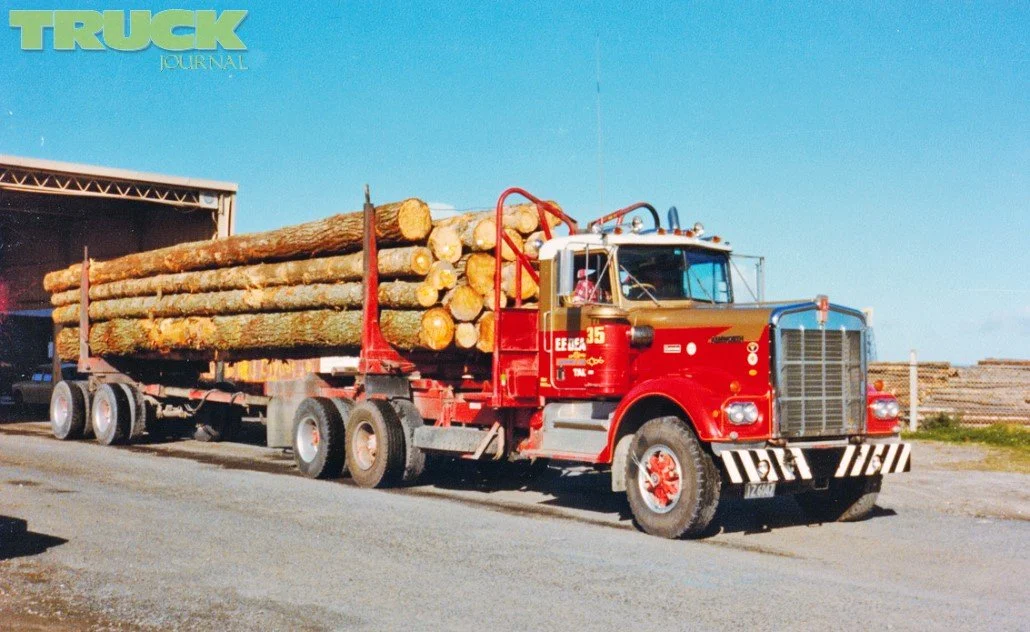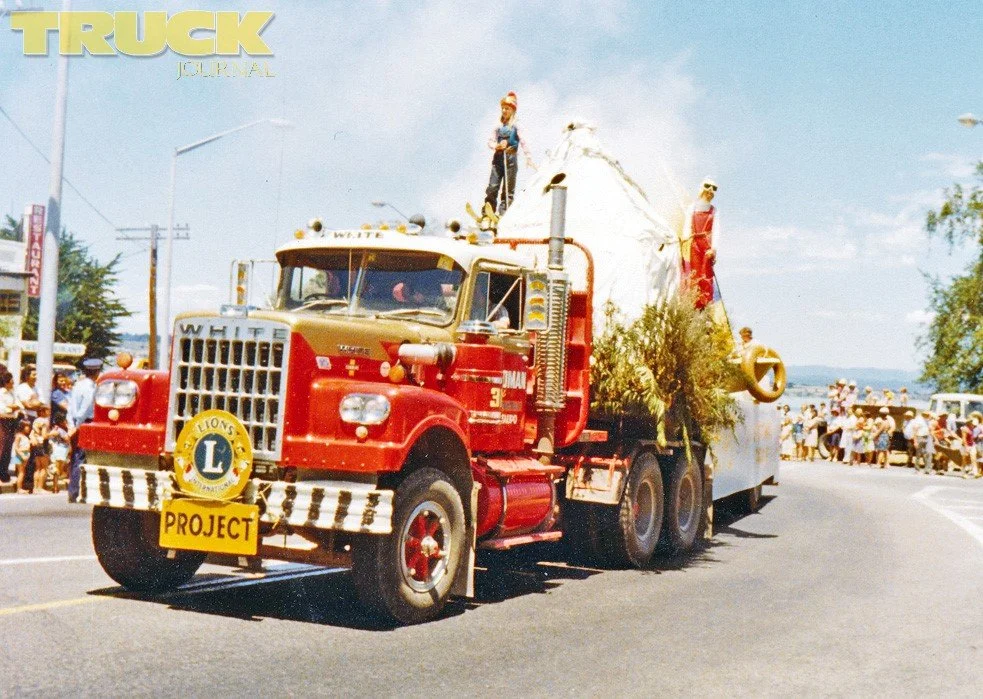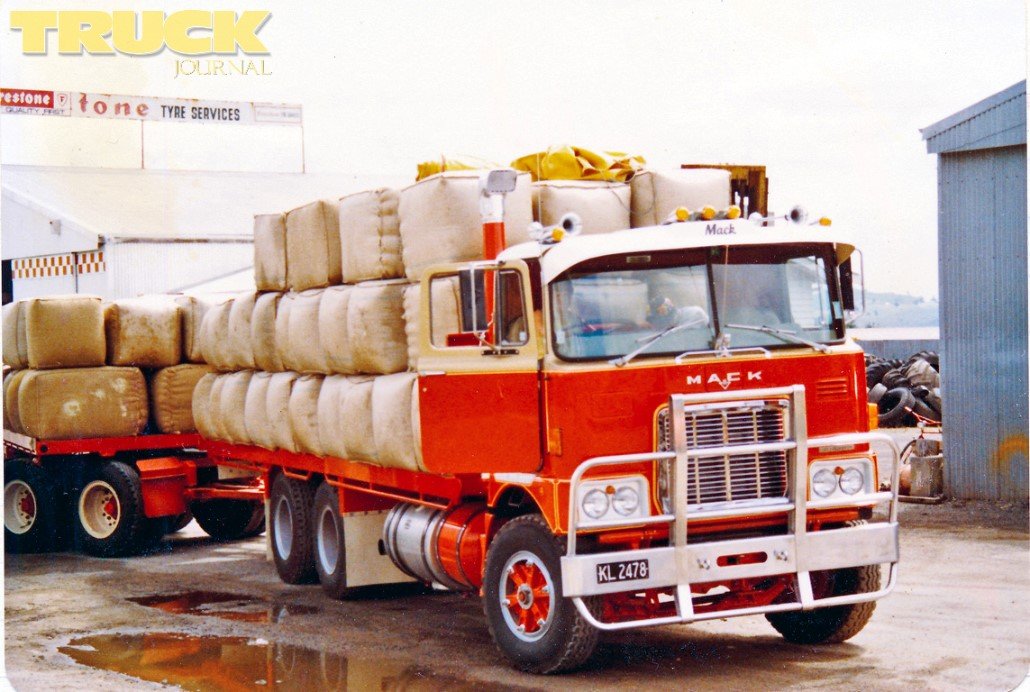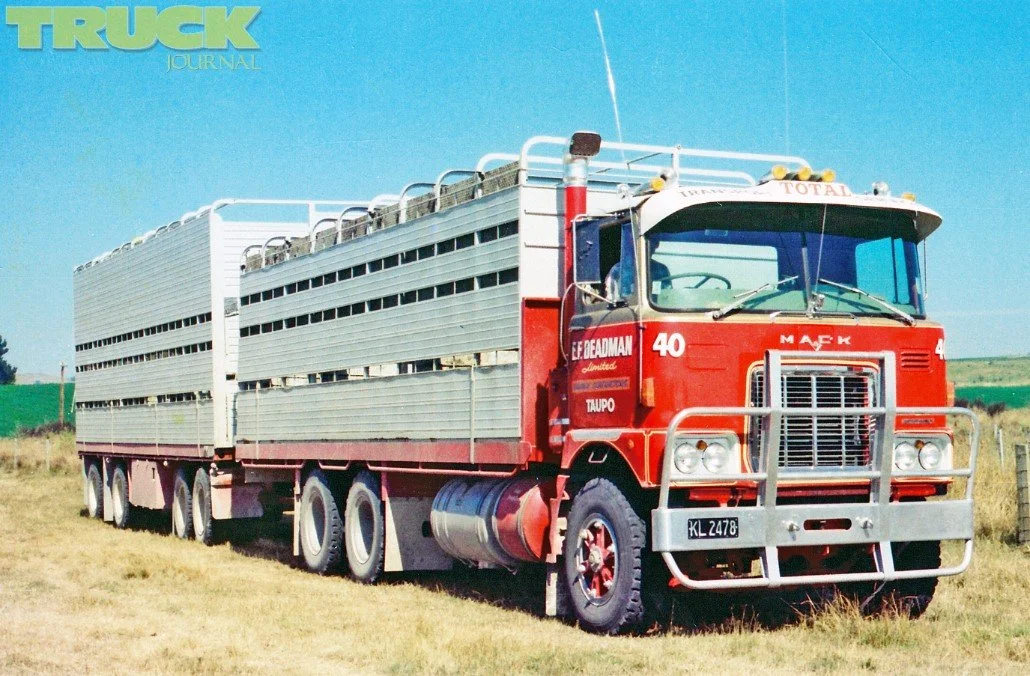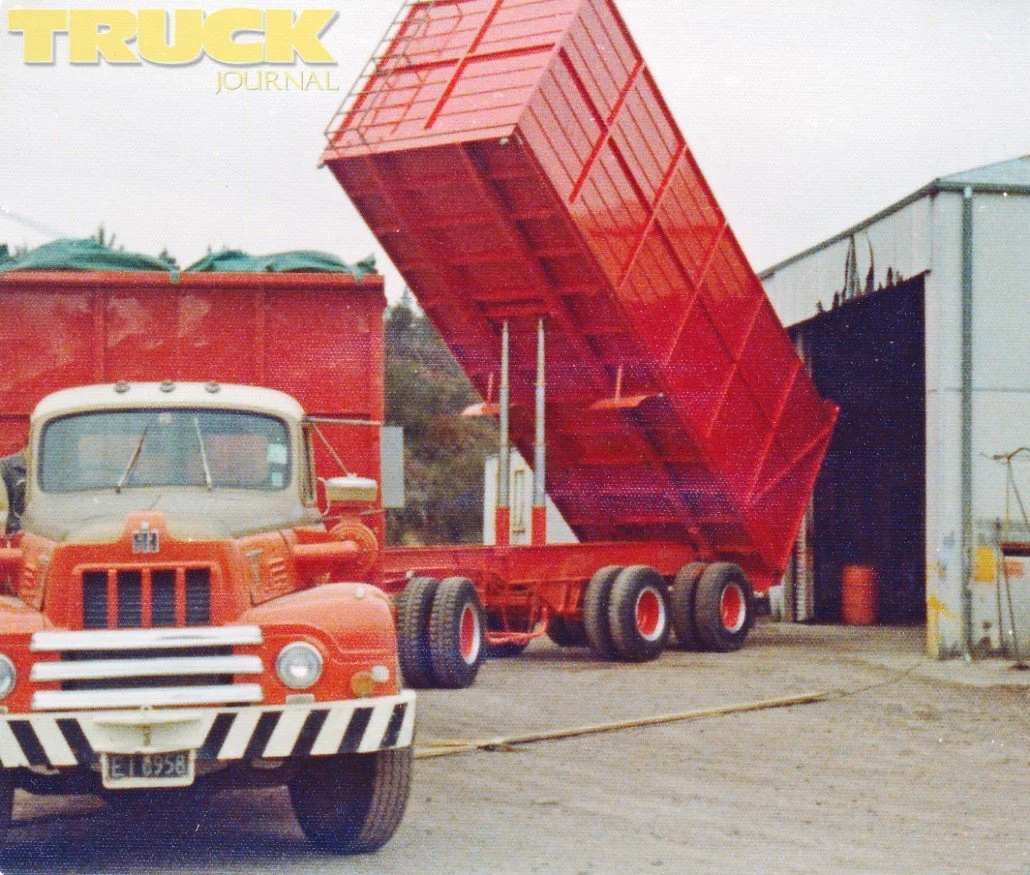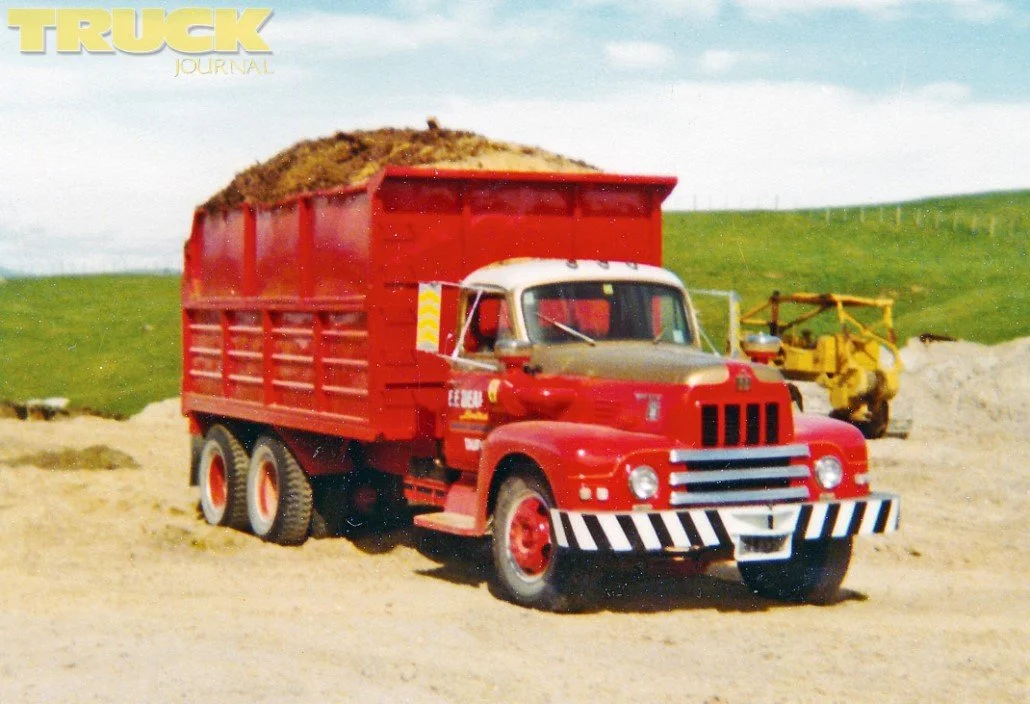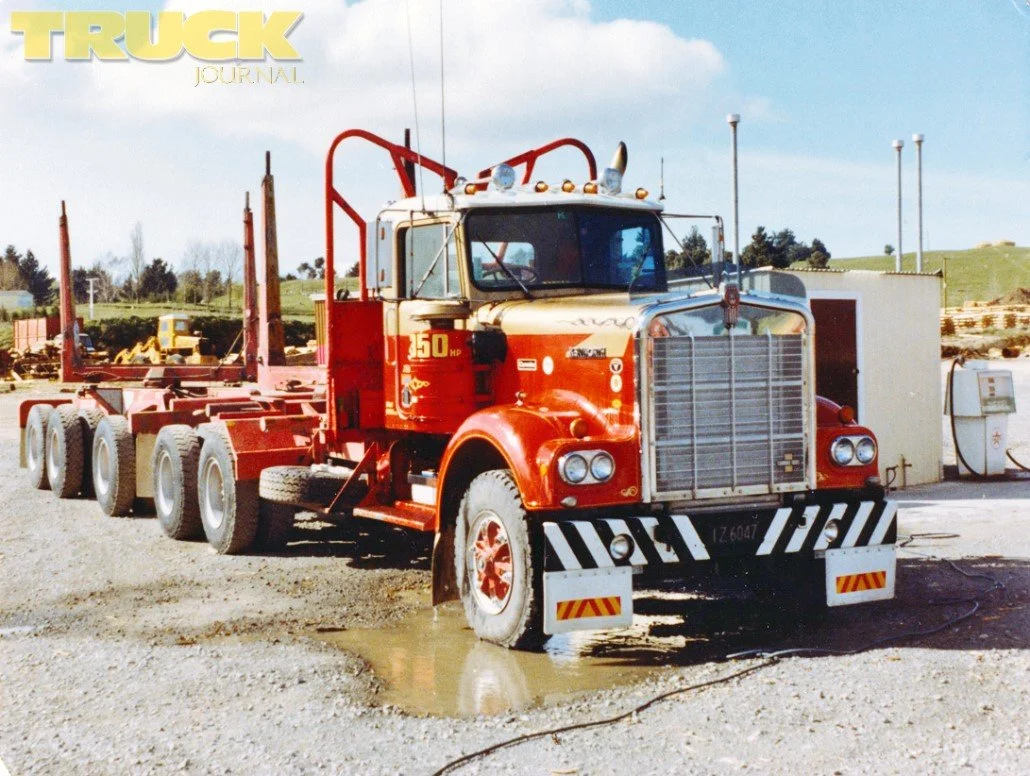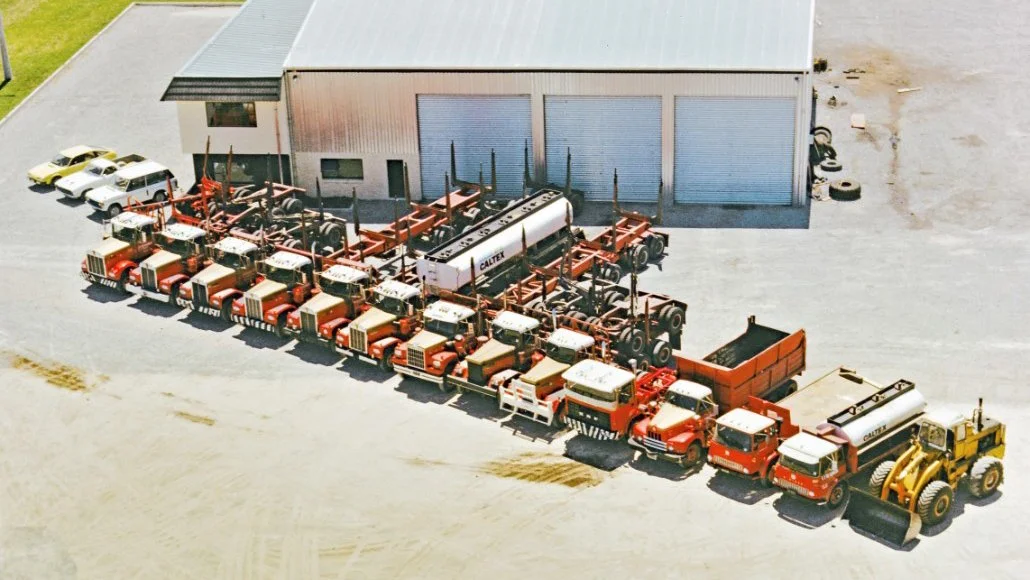Central NI logger EF Deadman Ltd recalled – Part Two
E F Deadman’s fleet line up in the Taupo yard prior to selling to Godfrey Holdings.
Article first published July 2019
Eric Deadman began hauling logs in the King Country before the Second World War. From small beginnings his business grew from a single truck to a small fleet before selling the business to his son Bob and his wife Margaret. By the early 1980s the changing regulatory environment and declining business ethics saw the new owners sell up their stake and take up farming, a decision they haven’t regretted. Simon Vincent continues the history of this well-known logging business.
To improve his ability to service and maintain his growing fleet of trucks, Eric built a workshop in his backyard and employed a mechanic to carry out the work. After the first mechanic departed, Ian Dunlop joined the team and remained the head mechanic for the following 26 years.
Ian brought a wealth of knowledge to the operation having previously worked for the local International dealers C P Hartage Ltd who had previously done Eric’s service work.
The International R190 was a firm favourite with Deadmans.
Eric insisted from early on that the trucks were fastidiously maintained and the fleet presentation was always at its best.
Wherever the trucks broke down was where they would be repaired, none were ever towed back to the workshop. Ian become very accomplished at roadside component replacement, even fabricating portable rigging to make the job of lifting heavy componentry more convenient.
Eric and the mechanics were responsible for a lot of the “modifications’ that were made to the trucks. They also set up the trucks from new to ensure the log bolsters were correctly positioned for the best weight distribution. They also made sure the chassis overhang was sufficient so as to ensure the best tracking of the trailers.
Bob has fond memories of working the native timbers. The trucks were loaded by winching the logs up onto their backs. The first job was (of course) to lift off the trailer with the winch before getting started.
A wire rope would be hooked into the trailer pin, wound over the top of the logs on the bolsters and then under the log which would be placed on the top of the load. The winch would quietly wind in the wire rope and carefully land the log exactly where they wanted it. What is amazing is that they only used chocks to hold the logs onto the bolster, there wasn’t a stanchion to be seen.
During the day drivers would have the assistance of the logging crew in loading, but early in the mornings the truck drivers would be doing the whole job themselves. Over time the winches were replaced with bulldozers.
A Wagner loader crabs a full load off an LW Kenworth in a single bite.
Bob enjoyed his days logging especially in the beginning. He says he started at around 5 to 5.30am and was normally off the road by 4pm every afternoon with all his jobs done. Hours were civilised and not excessive and the company could still make good money doing so.
They would do an average of two loads a day, sometimes they might squeeze in three.
In 1961 E F Deadman Ltd was incorporated.
By 1966 the native timber extraction was beginning to wind down and the distances travelled to collect it continued to increase.
Eric looked East and saw the burgeoning market for exotic timber increasing. He sought out and won contracts to cart exotics around the central North Island.
Bob was the first to relocate to Taupo. He clearly recalls delivering his first load of pine into Fletchers new Taupo saw mill on the 19th of September 1966.
They also serviced both Napier and Mount Maunganui.
The Deadman fleet was quietly relocated to Taupo with Eric and Lorna eventually moving there in 1971.
In 1974 Bob and his wife Margaret purchased the company from Eric.
The pair of Pacific loggers.
One of Pacific loggers that joined the fleet in 1974.
Another Pacific logger outside the Mt Maunganui tally shed.
A PAcific unloading at one of the saw mills.
A pair of heavy duty 1974 Pacific P9s and a single drive ACCO were the last of the International line with Kenworth set to dominate from there onwards, the first arriving in the early 1970s.
One of the unique trucks the firm owned was a Kenworth glider kit supplied by Dalhoff & King. The glider kit was one of only three imported into the country by Dalhoff & King (the other two went to Tokoroa).
A Kenworth glider kit supplied by Dalhoff & King was a unique way to lower the cost of a new vehicle.
The truck arrived with a front axle and suspension, radiator, hood and fully lined and wired cabin. The team in the workshop set to and added the engine and transmission along with the rear axles and suspension. The total savings from half building the truck themselves was around $20,000, which was a decent amount of cash.
Bob says the government soon put paid to this lucrative arrangement as they were missing out on the tax. The whole of the parts cost could be written off as maintenance rather than capital expenditure, which didn’t suit the bean counters.
Weighing in, a White with a self steer bailey bridge trailer.
Bob says they were the first occupiers of Rakaunui Road which is now one of the transport hubs in Taupo. They built a brand new workshop to service the fleet on the corner alongside the off highway road.
When the business was sold the building was sold to Godfrey Holdings. It has since changed hands but is still operating as a workshop to this day.
The logging fleet continued to grow, and eventually peaked at 13 or 14 units.
A WHite taking part in an annual Christmas parade.
The fleet had also diversified somewhat, there was also a Caterpillar D7 bulldozer and three Hough 65 wheeled loaders working in the forest.
The firm started hauling fuel for Caltex. JV Geany had a tanker wagon in their yard for some time and, when Geany’s decided to finish, the contract was offered to Bob, a long standing Caltex client.
To tow the Caltex owned tanker Bob only had to supply the tractor unit, which was a 335hp Cummins powered Kenworth (not the one Geany’s had used).
A rigid TK Bedford was used to deliver some of the fuel into the bush to keep the machinery working.
One of the original R190s was set up with bulk bins to remove waste from the Fletcher mill. Bob built a three axle chip style bin trailer to go with the International tipper to increase capacity.
The last truck to wear the famous red and gold Deadman colours was a 1981 Mack FR797 six wheeler. The cab and chassis set them back $96,000 at the time.
At $96,000 the Mack didn’t come cheap in 1981.
This truck was a flat deck with stock crates and spent much of its time contracted to Total Transport which was involved in rural cartage of all varieties.
The Mack spent a lot of time contracted to Total Transport hauling stock.
In the early 1980s Bob felt the time was right to move on. The changing legislative environment, ever increasing taxes and the changing nature of the business all aided in his decision to get out. Bob sold the log trucks to the drivers, creating a pool of owner drivers.
The Caltex bulk tanker was run for a further 12 months before Bob relinquished the contract and sold off the gear.
One of the LW Kenworths delivering fuel to Moller Motors under contract to Caltex.
The flat deck TK was kept and remains a family heirloom and is stored at the farm.
The FR Mack was sold to another owner driver who kept it working with Total Transport.
The R195 was eventually sold off when Bob had completed his contractual arrangement with the mill.
One of the International R190s converted to a bulk tipper with a thre axle trailer soldiered on long after the other R190s had been pensioned off.
With the trucks sold, Bob and Margaret bought farms and became farmers.
Bob looks back on his days behind the wheel with some fondness. He appreciated his early days when there wasn’t all the rush and hurry that is so prevalent today and felt that this made what could be a very dangerous occupation so much safer.
Bob is quite emphatic when he says the trouble today has been brought about by the desire to get more for less. He sees pushing staff to do long hours being reflected in the high accident rates. Big business has failed to recognise that they have become the source of the problem.
Disposing of waste wood products.
“The big companies want to make all the money,” he said.
He lost the appetite to remain in transport when they stopped making reasonable money as the clients began dictating cartage rates. Along the way any loyalty evaporated because there was always someone else just itching to step into your shoes.
Bob leaves us with a couple of enduring memories of his days behind the wheel.
He was being towed up a hill out of a very muddy skid when the tow rope broke! The truck immediately stalled and with no brakes soon started rolling backwards. Being a Detroit it happily restarted running backwards with air being sucked down the exhaust and exhaust fumes pouring out of the air cleaners.
“You had to learn to start to back pretty quick,” Bob said with a chuckle.
Another day, whilst using the Cummins powered International, he pulled up at a skid site to load. Asked if he wanted one or two logs he chose the latter. Once the two massive logs were on the back he headed in with the load. Approaching the first hill he shifted down to low low. Even with these gears selected the truck didn’t look like it would make the top of the rise. Not willing to stall the motor and lose the brakes, he slipped the truck into reverse, opened the door and backed right back to the bottom again.
What followed was a long walk back to the skid site to get the Series 1 Land Rover and driver to hook onto the front. The extra 36hp the Landy offered managed to get the load up the hill and on its way!
The trucks may have been sold, the company name lives on as part of a farming operation.
Whilst the familiar colours of EF Deadman may no longer be seen on our highways, the company name still continues as part of the farming operation. Bob and Margaret have long since sold their stake and today the company’s fortunes are in the hands of their son Stuart and his wife Catherine (Cate). They run a substantial dairy operation around Taupo.

